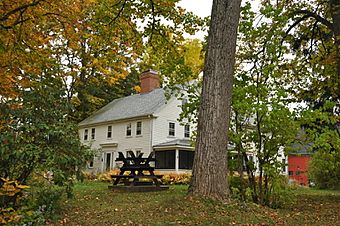Paul Family Farm facts for kids
Quick facts for kids |
|
|
Paul Family Farm
|
|
 |
|
| Location | 106 Depot Rd., Eliot, Maine |
|---|---|
| Area | 19 acres (7.7 ha) |
| Built | 1830 |
| Architectural style | Federal |
| MPS | Eliot, Maine MPS |
| NRHP reference No. | 98001232 |
| Added to NRHP | October 20, 1998 |
The Paul Family Farm is a really old farm located at 106 Depot Road in Eliot, Maine. It's a special place because it shows us what farming was like in the 1800s. The main house is a beautiful Federal style farmhouse from the early 1800s. You can also see some older buildings from the early 1900s. One cool thing inside the house is the amazing stencil art on the walls, made around the 1820s. This historic farm was added to the National Register of Historic Places in 1998.
Contents
About the Paul Family Farm
The Paul Family Farm is in a quiet, country area of Eliot, Maine. It sits near the corner of Depot Road and Goodwin Road. The farm covers about 19 acres.
The Farmhouse Design
The main house is a large, two-and-a-half story building. It is made of wood and has a roof that slopes down on two sides. A big chimney stands in the middle of the house. The outside walls are covered with clapboard siding.
The front of the house faces east. It has a main door in the center with fancy decorations. These decorations include narrow side windows and flat columns. A porch with a sloped roof runs along most of the north side. There is also a two-story section added to the back.
Inside the Historic House
The inside of the main house has a classic layout. A small entrance area and a winding staircase are in front of the central chimney. On each side of the chimney, you'll find a hallway and a parlor. The kitchen is located behind the chimney.
The parlor room is very special. It has wide wooden panels on the lower walls. Above these panels, the walls are covered in plaster. The fireplace mantel is in the Federal style, with decorative flat columns.
Unique Stencil Art
The walls of the parlor are decorated with unique stencil art. This art is similar to the work of a traveling artist named Moses Eaton, Jr.. The stencil work was refreshed in the 1920s. A local artist named Martin Frost signed his name on the updated art.
Farm History and Family
People believe the house was first built around 1804 or 1805. It was likely built by Hugh Tucker Paul. He was the son of Moses Paul, who first settled on this land. The Paul family continued to own the farm for many years. They still owned it when it became a historic landmark in 1998.
In the 1920s, Moses N. Paul added the two-story section to the house. He also built most of the other farm buildings. These include a woodshed, a workshop, and a garage. The farm's barn is even older, built around 1850. Later, in the 1960s, a chicken coop was added.



